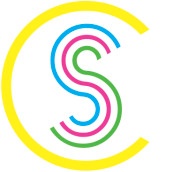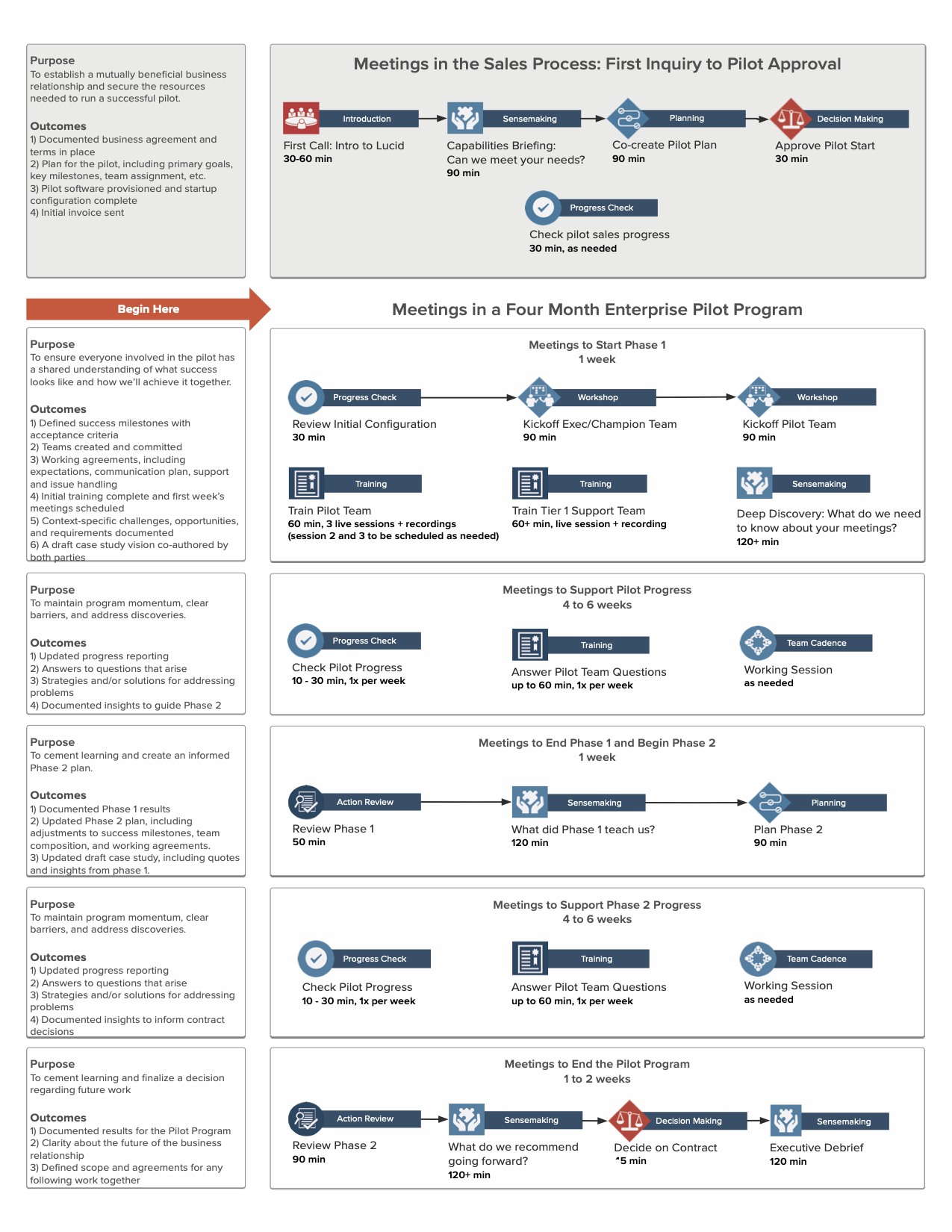Case Study: Collaboration Superpowers Uses Lucid Meetings to Automate Workshop Agendas and Keep Participants Engaged
Lisette Sutherland runs Collaboration Superpowers, a workshop facilitation business, from her remote office in the Netherlands.
Professional facilitators from all over the world license her materials to teach her Work Together Anywhere Workshop, both online and in person.

Collaboration Superpowers
When preparing for the workshop, Lisette spends a few hours setting up each section by creating an agenda, uploading documents, and setting up multiple software platforms for her participants.
However, because she uses Lucid for the online meeting segment, she’s able to leverage a pre-defined meeting template, automating both setup and follow through—saving her a minimum of thirty minutes in preparation time.
Meeting agenda templates also allow new facilitators to get up and running quickly, making her licensing business more scalable.
Over the course of a year, this huge time savings allows her to focus on improving the workshop curriculum and managing high-level business activities.
While using Lucid’s real-time collaborative note taking features, Lisette has seen great increases in attendee engagement. Users actively participate by making contributions during the meeting, which are captured for the final record and follow-up.
Additionally, when Lisette meets with a different set of colleagues, she acts as office manager and organizes meeting times and invitations, notes, summaries, action items, and follow up—all in different systems.
This coordination and upkeep can be quite time consuming. With Lucid, all of this tracking is located in one place, allowing visibility into progress made and helping participants determine exactly how to go forward.
Using Templates to Automate Agendas
When preparing for a workshop, one of Lisette’s tasks is to create a detailed agenda with activities, presentations, and handouts.
“I was so lucky to have found you—so many people ask me about agenda management. We use Lucid Meetings in the workshop, and when I present it, people really get it.”
After she spent some time to establish a desired framework, Lisette decided to create a meeting agenda template to automate the planning process for future workshops.
“What I especially like about Lucid is that I’ve created my own template. For every meeting I organize, I just add the people I want to invite to the meeting and the invitation goes out—they get reminders, and I don’t have to send anything manually.”
“I always look forward to the online meetings section of the workshop because I can just push a button and it’s done. There’s no prep work on my part—all of the handouts are in the agenda—it’s all just there. It’s a huge advantage for people.”
Lisette’s workshops benefit from the automation in Lucid Meetings by allowing her to replicate the experience for her licensed facilitators. The agenda templates she’s created are immediately usable by all team members, allowing her to be less involved in their setup processes.
“With Lucid Meetings, the process is more automated and I am not needed. There’s a whole function of my job that gets consolidated because Lucid is doing it for me. Once I found Lucid Meetings, it only made sense to use it to drive the agenda.”
Hands-On Collaboration Keeps Participants Engaged
One segment of Lisette’s workshop is focused on online meetings, and she decided to use Lucid for this section so participants could get hands-on experience using an interactive tool.
“One thing I’ve really found from the workshop is that you can tell people all you want about tools, but until they use it, they don’t get it. That’s why the workshop is built around getting people to use the tools.”
Lisette starts this part of the workshop with an icebreaker question, asking participants to post their answers using the collaborative note taking feature. This physical participation throughout the workshop keeps attendees engaged in the process.
“What I like about Lucid Meetings is that we can all take notes throughout the agenda. That’s one thing that we weren’t able to do before, and now people can write things down, ask questions, use the chat, raise their hands—which makes it even more interactive, because they’re participating now.”
Once the workshop is over, all of the notes and action items that were captured in Lucid are already formatted to send out via email to participants.
Technology and Training for Remote Collaboration
In her years of teaching remote working techniques, Lisette has observed that the customers signing up for her workshop tend to be large, global companies with employees around the world. Some are downsizing, and she’s seeing more employees working from home offices.
This trend comes as a surprise—after years of practice, global companies should be familiar using technology for distributed teams. However, the equipment they’re using tends to be out of date compared to smaller, more nimble companies.
“It’s actually some of the larger companies that really need this type of training. So many technologies have changed just over the last five years in remote working, and companies don’t know what tools are available or the pain they’re in.”
When larger companies commit the resources to fixing collaboration at scale, it can have massive impacts on revenue. However, most companies fail to teach even basic facilitation techniques for in-person meetings, and there’s less of an emphasis on skills for running online meetings.
“If remote work was so easy, everyone would be doing it.”
Measuring Progress for Continuous Improvement
One hat Lisette wears for a different team is Remote Office Manager. She spends time wrangling details so everyone else can get work done—by setting up and summarizing meetings, following up on action items, making sure Google Drive is organized, and coordinating all of the logistical pieces.
“One thing that has been a shift for me is that when I work with other teams, our meeting information is spread out into different systems: we keep a copy of the recording in one place, a meeting summary in Slack, documents in Google Drive, and tasks in Trello.”
Once Lisette started using Lucid for her workshops, she realized that the extra tasks she was taking on for other groups could be eliminated.
“When I run a project retrospective with one team, I have to write down all of the action items and I personally follow up with everybody—it’s just not efficient.”
Most people that facilitate or attend meetings are accustomed to interacting with multiple tools. They typically use email for invitations, a document repository for presentations, notes and/or agendas, meeting connectivity software, and email again for follow up.
The benefit of having one place to capture and review notes, decisions, or outcomes from a meeting is generally not something people imagine as a possibility. This consolidation of information allows teams to review what they’ve accomplished, then determine what’s next.
“The efficiency of having everything in one place—that’s the best. You’re meeting to solve something, so you need to look back at the previous notes and you want to be able to track progress. If you’re not measuring progress, then you’re not going anywhere.”
Dive in, Then Iterate
New users of any software can be intimidated by learning something they haven’t used before. However, when starting with the basics—like using an agenda and taking a few notes in Lucid—users are surprised at how easy and impactful it is.
“If somebody were to ask me about Lucid, I’d tell them to just start. Don’t try to make everything perfect when trying something out—dive in and iterate from there. Don’t make it a project. It’s super easy—log in, start a meeting.”
Once users get acclimated, they can easily transition to more sophisticated features. Lisette’s workshops provide a great opportunity for participants to test out multiple remote working technologies all in one session.
“You simply have to experiment with remote tools for remote work—or you will be handcuffed.”
Conclusion

The team at Collaboration Superpowers is dedicated to helping groups feel comfortable in a remote working environment and communicate easily with their colleagues around the world.
By using the Lucid Meetings platform, Lisette and her licensed professional facilitators can save setup and follow up time, encourage interaction and keep participants fully engaged.
More importantly, running these remote workshops for customers results in teams that know their involvement has a purpose, and they walk away feeling empowered.
Learn more about Collaboration Superpowers and their remote team workshops in this video and at www.collaborationsuperpowers.com.
Download the PDF version of this case study to share with your team.



